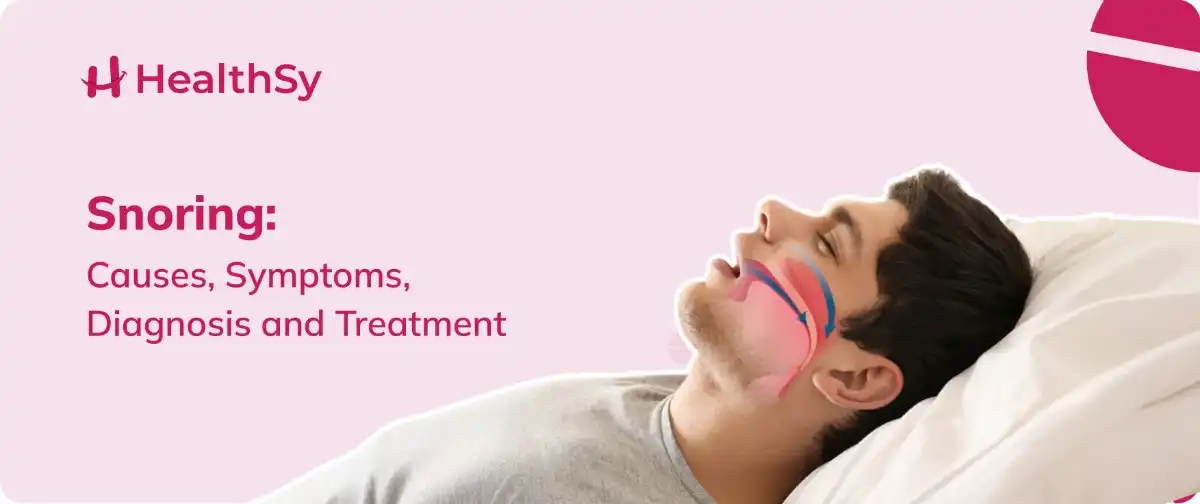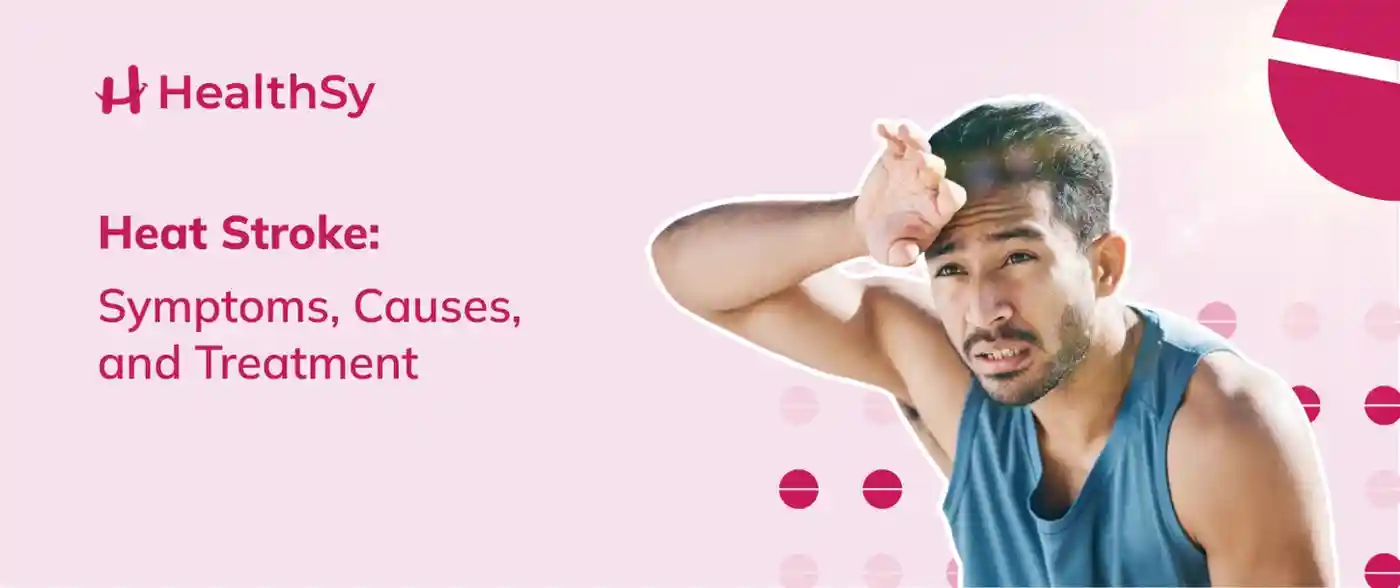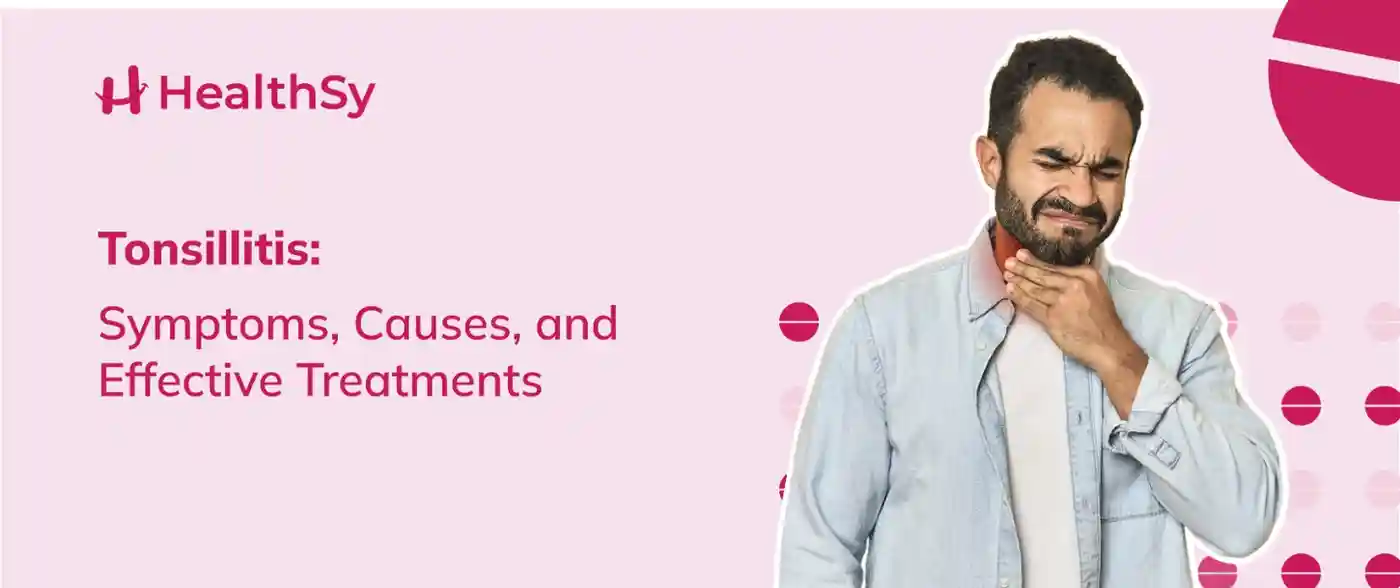Snoring: Causes, Symptoms, Diagnosis and Treatment

Snoring is more like noisy breathing during sleep. It is a very common condition that can affect many people, primarily overweight people. Generally, snoring happens when air flows past the relaxed tissues in the throat, making the tissues vibrate while you breathe. However, most people snore when they are tired, and at times, for some, it can be a chronic condition. Snoring also indicates a severe condition. If you feel your snoring seems normal, you can visit a doctor and get your questions answered.
Snoring
Mostly, snoring happens when there is no proper airflow through the nose and mouth or when the air passing from mouth to nose gets blocked. Along with which there are a few things that cause snoring:
- Overweight issues: Sometimes, being overweight can cause snoring. Children with bulky throat issues and large tonsils and adenoids snore more often.
- Alcohol and drug use: Drinking excess alcohol and any other drug use would also make you snore.
- Sleep positions: Sometimes, sleeping on your back makes you snore. In that case, you can use a soft and comfortable pillow.
- Blocked nose: A few people snore when they have allergies. For instance, allergies like dust and sinuses block nasal airways, leading to snoring while you sleep.
- Sleep Deprivation: When you are sleep deprived, your throat muscles have more chances to relax, which can cause snoring issues.
- Poor muscle tone in your throat: Your tongue and throat muscles could be more relaxed, which will make you snore.
Snoring Symptoms
Snoring is associated with a type of sleep disorder called OSA (Obstructive Sleep Disorder), but it doesn't mean that everybody will have OSA. A few snores due to prevalent reasons like nose blocks, etc. A few significant symptoms of snoring include the following:
- Morning headaches
- Restless sleeping
- High blood pressure
- Chest pain during the night
- Difficulty in concentrating
- Sleeping during the daytime
- Sore throat
- Gasping at night or feeling choked
- Poor attention span in children, poor performance, behavioral issues.
OSA can be differentiated by loud snoring followed by silence. This pause or silence or break in breathing will sometimes signal you to wake up with a gasping sound.
When should you consult a doctor, and whom should you consult?
If you experience any of the symptoms mentioned, it's essential to consult your doctor, as they could be signs of obstructive sleep apnea (OSA). You can either consult an ENT doctor or a primary physician to get it treated.
If your child snores, discuss it with their pediatrician. Children can also suffer from OSA, often due to issues like enlarged tonsils or obesity, which can narrow their airways and lead to OSA.
Snoring Diagnosis and Treatment
Ensure to tell your doctor if you feel uncomfortable about your snoring. You or your family could explain the sound or something that makes your snoring feel wrong. That way, your doctor can diagnose the cause of your snoring issue. Also, talk to your doctor about your medical history; it will help them know more about your health condition.
After a straightforward discussion, your doctor might give a few tests to diagnose the condition that would include the following:
- Imaging test: This is more like an X-ray, CT scan, or MRI, using which the problems in your nasal airways can be found
- Sleep Study: This test involves machine monitoring that records your sleep at home. Alternatively, you can go to a lab for a test called polysomnography. This test records your heart rate, brain activity, and breathing while you sleep.
Treatment
Here are some potential treatments for snoring:
- Lifestyle: Your doctor may recommend losing weight, quitting smoking, or avoiding alcohol before bedtime.
- Oral Appliances: These small plastic devices, worn in the mouth during sleep, help keep airways open by adjusting the position of the jaw or tongue.
- Surgery: Various surgical procedures can reduce snoring by removing or shrinking throat tissues or stiffening the soft palate.
- CPAP: A continuous positive airway pressure machine can treat sleep apnea and potentially reduce snoring by blowing air into the airways during sleep.
Home Remedies to Avoid Snoring
Here are some home remedies to help reduce snoring and improve your sleep quality:
- Sleep on your side instead of your back.
- Elevate the head of your bed by a few inches.
- Use nasal strips to open your nostrils.
- Maintain a consistent sleep schedule.

Coughs generally have two types: productive coughs, which produce mucus and phlegm, and unproductive coughs, known as dry coughs.
A dry cough is a continuous cough that does not produce phlegm or mucus. It is commonly caused by discomfort in the airways. This dry cough could also be a cold, flu, allergies, or asthma symptom. Sometimes, a dry cough will be a symptom of severe conditions. However, a prolonged dry cough can affect your day-to-day life, particularly if it disturbs your sleep.
Now, keep reading to know more about dry cough in detail.
Common Causes of Dry Cough
A dry cough can be caused due to various reasons. A few include the following.
- Asthma or bronchitis
- GERD (Acid Reflux)
- Environmental irritants like pollution and Smoke
- Viral infections like the flu or a cold
- Allergic reactions due to pollen or dust
Home Remedies for Dry Cough
There are multiple home remedies available to reduce a dry cough. The following are a few that you can try to keep your cough under control:
- Honey and Warm Water: Helps soothe throat irritation
- Steam Inhalation: Helps ease inflammation and congestion
- Turmeric Milk: Acts as the best anti-inflammatory agent
- Ginger Tea: Reduces inflammation and fights infections
- Saltwater Gargle: Helps reduce throat discomfort
While these home remedies are helpful, you must consult your doctor and get expert
advice if the symptoms persist for a long time. Seeing a doctor will help rule
out the issue faster.
Choosing the Right Dry Cough Syrup
If you prefer a dry cough syrup, ensure it suits and works with your symptoms. Most dry cough syrups contain diphenhydramine or dextromethorphan, decreasing the cough reflex. However, do not self-medicate, particularly if you are unsure about your symptoms. Always consult a doctor before choosing a dry cough syrup, particularly for children, older people, or people with pre-existing conditions.
When Should You Consult a Doctor for a Dry Cough?
Here are a few signs that indicate it’s time to stop self-medicating and consult a doctor immediately:
- If the cough lasts more than 3 weeks
- If it gets worse than before
- If you feel chest pain, wheezing, or discomfort breathing
- If you notice fatigue and weight loss
- If you cough up blood
Knowing when to consult a doctor
for a dry cough is crucial to avoid complications and ensure an easy diagnosis.
Whom to Consult for Dry Cough?
If you have a dry cough, you can consult a general physician, who will refer you to a pulmonologist if you need to get your lungs tested or if there are any chances of infections causing your dry cough.
Consulting the right specialist will help you treat a dry cough and identify the root cause of the cough.
Final Takeaway
A dry cough might seem less harmful at the early stages, but it is crucial to see a doctor when you feel like it increases or worsens over time. Your doctor will prescribe antibiotics or suggest the right treatments to get you treated and avoid any complications due to dry cough. Never ignore the symptoms, and use the best medical facilities available. Do not hesitate to consult your doctors when necessary. Early action is one of the best treatments to keep your body healthy and illness-free.

During the summer season, heat-related illnesses are becoming increasingly common. In fact, many people experience heat cramps, dizziness, fainting, blurred vision, slurred speech, and confusion. If these symptoms are not addressed promptly, they can lead to Heat Stroke. Last year 2024, between March 1 and June 18, 110 people in India died from heat strokes, according to data from the Health Ministry. This article provides essential information on recognizing the symptoms of heat stroke, its causes, and the appropriate treatment to prevent fatalities.
What is Heat Stroke?
Heat stroke, or sunstroke, occurs when a person's body temperature rises quickly and cannot cool down. It is a serious and potentially life-threatening condition that can damage the brain, heart, kidneys, and muscles and can be fatal without prompt treatment. Generally, heat strokes are classified into two main types:
1. Exertional heat stroke:
Intense physical activity in hot or humid conditions causes exertional heat stroke. It generally affects athletes, military personnel, and outdoor workers who engage in prolonged activities without adequate hydration or cooling breaks.
2. Non-exertional (classic) heat stroke:
This type of stroke, also known as classic stroke, occurs during exposure to extended periods of hot environmental conditions, such as heat waves or long durations of high temperatures and humidity. Older adults, infants, and individuals with chronic medical conditions are vulnerable to this stroke.
Symptoms of Heat Stroke
The symptoms can vary based on the severity of the condition, but common symptoms include the following:
- 104 degrees Fahrenheit or higher body temperature
- Behaviour changes such as agitation or aggression.
- Hot, dry skin occurs in cases of classic heat stroke.
- Flushed, sweaty skin occurs in classic heat stroke.
- Increased heart rate
- Headache
- Nausea and vomiting
- Seizures
- Muscle cramps or weakness
Causes of Heat Stroke
Several factors contribute to heat stroke, which include:
- Spending long hours in a hot and humid environment
- Dehydration results from inadequate fluid intake or excessive fluid loss
- Engaging in strenuous physical activity, especially in hot conditions
- Wearing too many clothes or tight-fitting garments can trap heat
- Chronic illnesses such as heart disease, respiratory conditions, obesity, and mental health disorders can increase vulnerability to heat stroke
Risk Factors of Heat Stroke
While anyone can suffer from heat stroke, certain factors can increase the risk:
- Age: Infants and people over 65 are less efficient at regulating body temperature.
- Chronic illnesses: heart disease, lung disease, kidney disease, and obesity heighten susceptibility.
- Medications: Drugs that affect hydration and heat regulation raise the risk.
- Sudden exposure: Moving from a cooler climate to a much hotter one can shock the body.
- Lack of air conditioning: Living without cooling systems during heat waves increases danger.
Treatments of Heat Stroke
Heat stroke is a life-threatening condition that demands immediate medical attention to avoid severe complications or death. Treatment usually includes the following steps:
- Cooled IV fluids
- A cooling blanket
- An ice bath
- Medication to prevent seizures
- Supplemental oxygen
- A cold-water lavage
Conclusion
As temperatures continue to rise, preventing yourself from heat stroke is more important than ever. To protect yourself from heat stroke, stay hydrated, wear lightweight and breathable clothing, avoid outdoor activities during peak heat hours, and take frequent breaks in the shade. If you or someone you know shows signs of heat exhaustion or heat stroke, do not delay. Look for immediate care and consult a healthcare professional for proper treatment.

We have all felt a cramp that
comes out of nowhere, a twist in the gut, a belly bloating after full meals,
and a dull pain that never goes away. Stomach Pain! Yes. At some point almost
everybody would have experienced stomach pain in their entire lives. Whether it’s
a cramp or a dull ache in the abdominal area, the discomfort that you feel will be
heavy. It can significantly affect your routine day. At times, the stomach can be due to some digestive issues, periods, cramps, etc. It is important that you get the attention of a medical professional if your stomach pain is unbearable.
Never self-medicate. Instead, you can try a few home remedies that don’t harm you in any way. They might soothe your pain and ease your discomfort. In this article, let us learn a few efficient home remedies for stomach pain.
1: Sip on Herbal Teas or Warm Water
One of the best ways to reduce and soothe stomach aches is by drinking more water and herbal teas. Warm water can help relax the abdominal muscles and improve digestion. Herbal teas like chamomile, ginger, or peppermint are particularly beneficial. Ginger tea is known for its anti-inflammatory and anti-nausea properties. Peppermint helps relieve bloating and gas, making it ideal for general discomfort or pain in the lower abs caused by indigestion.
2. Apply a Heating Pad
Heat therapy is an age-old remedy that’s still effective today. Placing a heating pad or hot water bottle on your abdomen can relax the muscles and improve blood flow, reducing cramping or tension. This is especially useful for menstrual cramps or gas-related discomfort.
Tip: Always wrap the heating pad in a cloth to avoid burning your skin, and limit use to 15-20 minutes at a time.
3. Follow the BRAT Diet
When you're dealing with nausea, diarrhea, or general digestive upset, the BRAT diet (Bananas, Rice, Applesauce, Toast) is a gentle way to keep your stomach calm while providing some nutrition. These bland, low-fiber foods help firm up stools and don’t irritate the stomach lining, making them excellent for recovery.
Avoid spicy, fatty, or dairy-rich foods during this period, as they can worsen symptoms.
4. Try Natural Antacids
For those suffering from acid reflux or heartburn, which can cause upper abdominal discomfort, a natural antacid might help. Baking soda (sodium bicarbonate) mixed with water can temporarily neutralize stomach acid. However, this is a short-term solution and should not replace prescribed stomach pain medicine.
Another option is chewing on a few basil leaves or drinking aloe vera juice—both are known for their stomach-soothing properties.
5. Practice Gentle Movement or Yoga
If you're experiencing bloating or gas that leads to pain in lower abs, light movement can help relieve the discomfort. Yoga poses like "Child’s Pose", "Knees-to-Chest", or "Supine Twist" can help stimulate digestion and reduce trapped gas. Walking for just 10-15 minutes can also help get things moving through your digestive system.
6. Use Apple Cider Vinegar (ACV)
While ACV might not be ideal for all types of stomach pain, it can be effective for indigestion. A tablespoon of apple cider vinegar mixed in warm water, taken before meals, may help regulate stomach acid levels. Be sure to drink it through a straw to protect your teeth, and always dilute it properly.
7. Hydrate and Rest
Sometimes, the best remedy is simply giving your body time to heal. Dehydration can make stomach symptoms worse, so sipping fluids throughout the day is key. Avoid caffeine and alcohol, and get plenty of rest. A relaxed body often leads to a calm gut.
Which doctor to consult for Stomach Pain?
While there are so many home remedies for stomach pain, they may help in mild cases. At times it is crucial to consult your doctor and get your symptoms checked to know if it is a common stomach pain or something that must be concerned about. Mostly, in case of stomach pain, you can consult a general physician or a gastroenterologist.
When to see a doctor?
Consult a doctor if you experience:
- Severe or persistent pain
- High fever
- Vomiting blood or black stools
- Sudden and sharp pain in lower abs
- Inability to keep food or fluids down
- Pain that lasts more than a few days
These could be signs of a more serious condition like appendicitis, ulcers, gallstones, or gastrointestinal infections.
Final Takeaway
Home remedies basically are a great way to manage stomach pain and digestive discomforts. Just following a few simple things will help. For instance, having herbal teas, warm compress, and dietary changes will offer significant relief. Also, do not hesitate to consult your doctor if the symptoms persist or worsens. In a few cases, getting diagnosed professionally with proper medications will help fast recovery.

Tonsillitis is one of the most common ENT problems, especially among children and teenagers. In fact, many people experience it at least once in their lifetime. However, it can be difficult to differentiate between tonsillitis and other throat infections like strep throat, as the symptoms often overlap. If throat pain becomes persistent and starts interfering with daily activities, it is important to consult an ENT specialist. In this article, we will explore what tonsillitis is, along with its symptoms, causes, and available treatment options.
What is Tonsillitis?
Tonsils are small, oval-shaped pads located at the back of your throat. They are part of the immune system and help to defend against the bacteria and viruses that enter your mouth. When an infection develops in the tonsils, it becomes inflamed or swollen, and this condition is called tonsillitis.
Tonsillitis can occur in two forms:
- Acute: Generally, lasts for a short period of time, caused by viral or bacterial infections
- Chronic: This may last for an extended period of time; individuals may experience multiple episodes of acute tonsillitis. experienced multiple episodes of acute tonsillitis.
Symptoms of Tonsillitis
People who suffer from tonsillitis experience the following symptoms depending on the severity of the infection. This includes:
· Sore throat
· Fever
· Fatigue
· Bad breath
· Headache
· Difficulty swallowing
· Swollen and red tonsils
· Voice changes or hoarseness
· Swollen lymph nodes in the neck
· White or yellow coating on the tonsils
Causes of Tonsillitis
Tonsils are vulnerable to infections, even though a part of the immune system. When tonsils are infected by bacteria or viruses, it causes discomfort in the throat.
· Viruses such as Epstein-Barr Virus (EBV), Adenovirus can cause tonsillitis.
· Group A Streptococcus (GAS), Staphylococcus aureus are the most common bacteria that cause tonsillitis.
Other causes of tonsillitis are,
Second-hand smoke
Environmental pollutants
- Age
- Allergies
- A weakened immune system
Diagnose of Tonsillitis
To identify tonsillitis, the healthcare provider takes the following steps to provide treatment.
Medical History: The ENT doctor evaluates the symptoms and their duration, and the recurrent history of throat infections.
In some cases, the ENT doctor might ask for some tests to identify tonsillitis. This test includes a throat swab, blood tests.
After identifying tonsillitis, the doctor provides appropriate treatment based on the severity of the tonsillitis.
Tonsillitis Treatment
Tonsillitis treatment is completely based on the cause. If it is by viral infection, the doctor may suggest taking proper rest, providing an Over-the-counter pain reliever, and a humidifier.
If tonsillitis is caused by bacterial infection, particularly Group A Streptococcus, doctors commonly prescribe antibiotics such as penicillin or amoxicillin, and it is crucial to complete the full course of medication even if the symptoms begin to improve earlier.
In some severe and recurring cases, the doctor may suggest tonsillectomy, a procedure to surgically remove your tonsils.
Who is at Risk of Tonsillitis?
- Tonsillitis can affect people of all ages, but it is most common in children and adults.
- People who are exposed to irritants like smoke or pollution develop tonsillitis.
How to prevent Tonsillitis?
People can reduce the chance of developing tonsillitis. Here are some tips that help to reduce tonsillitis:
- Regular Hand Wash: Maintaining hand hygiene is essential in preventing tonsillitis.
- Cover Mouth and Nose: Respiratory droplets can also spread the virus; always cover your mouth and nose while sneezing or coughing.
- Dental Hygiene: Practicing good oral hygiene can reduce the risk. Try to replace your toothbrush at least once in three months.
- Manage Allergies: Addressing and managing allergies can contribute to throat irritation and inflammation.
- Prompt Attention: If a sore throat develops, especially if it persists or is accompanied by other symptoms, it is important to consult an ENT doctor for proper treatment.
In conclusion, tonsillitis is a common condition;
understanding the symptoms, causes, and treatment options is essential for timely
and effective intervention. You cannot completely prevent tonsillitis, but you
can reduce the risk by following proper hygiene practices. If you suspect or
your throat pain becomes severe, do not hesitate to consult an ENT doctor to
prevent complications.

Famous for their speckled flesh and vibrant pink skin, dragon fruits, also called pitaya fruits, are an excellent tropical delight globally. These pitaya fruits have endless health benefits, more than just being a good-looking fruit inside. It is a powerhouse of antioxidants, nutrients, and hydration. So, does this pitaya fruit have side effects, too? Let’s check out.
This article explains dragon fruit, also known as pitaya fruit, its benefits, side effects, and more.
What is Pitaya Fruit or Dragon Fruit?
Pitaya fruits, commonly known as dragon fruit, are basically from a cactus species native to Central America. But today, it is a very well-known fruit throughout the Asian continent, the Caribbean, and Australia. The fruit is consumed in two common types: white-fleshed and red-fleshed; both contain black seeds. This pitaya or dragon fruit has numerous health benefits regardless of the type. Now, are you ready to get to know them in detail?
Dragon Fruit or Pitaya Fruit Benefits
The following are a few proven health benefits of dragon or pitaya fruit. Keep reading!
- Boosts immunity
- Hydrates your body
- Improves gut health
- Promotes healthy skin
- Supports digestion
- Enhances iron levels
- Regulates blood sugar
- Improves heart health
- Helps in weight management
- Reduces inflammation
- Fights anaemia
- Increases your energy level
- Improves body metabolism
- Strengthens bones
- An excellent choice for pregnant women
- Aids liver function
- Improves Eye Health
With so many health benefits, dragon fruit is a magical delight everyone should include in
their healthy diet. This is the primary reason for the prominence of the pitaya
fruit’s health globally.
Possible Dragon Fruit or Pitaya Fruit Side Effects to Know!
While dragon fruit's health benefits are impressive, there are a few mild and rare side effects to consider, mainly if you are a first-time dragon or pitaya fruit consumer.
- Watch out for allergic reactions. After having dragon fruit for the first time, some might experience itching, swelling, and hives.
- If you are a person who has low BP already, then eating pitaya might lower it further.
- Eating too much pitaya or dragon fruit can sometimes cause diarrhea since it is more fiber-containing.
- The high pigments in dragon fruit can temporarily transform the colour of your stool or urine.
- In drug interactions, some compounds in the fruit can interact with medicines. So, consult your doctor immediately if you face any weird symptoms.
Despite these dragon fruit side
effects, they are generally rare. Most people enjoy the benefits of dragon
fruit without any adverse outcomes.
How to Eat Dragon Fruit or Pitaya Fruit?
Dragon fruit or pitaya fruit can be consumed in various forms. You can add it to salads, toasts, pancakes, salsa, desserts, and ice creams, make smoothies, or scoop it and eat it raw. In any form, it is crucial to have it often.
Final Takeaway
From improving digestion to boosting your immune system and skin health, the benefits of dragon fruit are truly commendable. Including it in your daily routine is an excellent addition to your health. This nutrient-rich and vibrant pitaya fruit is a delicious way to support your wellness naturally. With all these benefits, it is also crucial to consider its rare side effects to enjoy this tropical delight responsibly. So, enjoy dragon fruit based on your taste and preferences.

Post A Comment